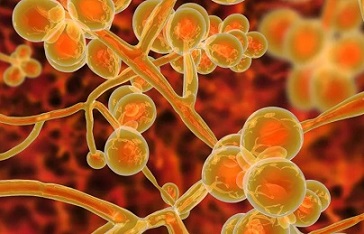Medical News: Outsmarting Fungal Resistance - Scientists Discover a New Way To Beat Deadly Fungus
TMN News Team Aug 03, 2023 2 years, 5 months, 4 weeks, 2 days, 4 hours, 24 minutes ago
Medical News: Fungal infections, often overlooked in comparison to bacterial infections, pose a significant threat to human health, with millions of deaths reported annually due to species like Candida, Cryptococcus, and Aspergillus. To make matters worse, fungal resistance to existing anti-fungal drugs is on the rise, raising concerns about the effectiveness of current treatments and the growing death toll.

In the face of this daunting challenge, a team of scientists from the RIKEN Center for Sustainable Research Science (CSRS) and the University of Toronto has made a groundbreaking discovery that could revolutionize the fight against deadly fungi.
The study team embarked on a mission to find a new approach to combat fungal infections - one that would be effective against various fungal species. They focused their efforts on targeting fatty acid production, a crucial component of fats, within fungal cells.
Traditionally, anti-fungal medications work by destroying the fungal cell wall or membrane, but these treatments are highly specific, meaning they might not work against different fungal species.
The study team began their quest by screening the vast and diverse RIKEN natural product depository (NPDepo) against four pathogenic yeasts - three Candida and one Cryptococcus species, identified as critical human pathogens by the World Health Organization. Their aim was to discover a compound that could impact all four species, indicating the potential for a broad-spectrum antifungal.
After an extensive screening process, the study team identified several compounds that significantly inhibited the growth of each of the four species. Narrowing down the options, they identified three promising candidates, and among them, one stood out for being the least toxic to human cells while also exhibiting potential against the deadly fungal mold Aspergillus fumigatus. This compound was named NPD6433.
Next came the critical task of understanding how NPD6433 achieved its remarkable effects. The researchers examined nearly 1000 different genes and their interactions with the compound. They found that the reduction of one specific gene, fatty acid synthase, made the yeast more susceptible to NPD6433. This suggested that the compound worked by inhibiting fatty acid synthase, preventing the synthesis of fatty acids within the fungal cells.
To solidify their findings, the researchers conducted further experiments and confirmed that NPD6433, along with another fatty acid synthase inhibitor called cerulenin, was able to kill numerous yeast species in laboratory cultures.
The true test of NPD6433's potential as a therapeutic agent came when the study team tested it in a live laboratory model organism i.e. the worm Caenorhabditis elegans - infected with a pathogenic yeast that can cause systemic infection in humans. The results were promising, as treating infected worms with NPD6433 reduced fatalities by approximately 50%, even when the yeast was resistant to standard anti-fungal medication.
Lead author, Dr Yoko Yashiroda, from RIKEN CSRS told Thailand
Medical News, "Drug-resistant fungi are a growing problem, and leads for the development of new drugs offer hop
e against these evolving pathogens. Our research indicates that targeting fatty acid synthesis is a promising alternative therapeutic strategy for fungal infections and one which might not require tailor-made solutions for individual species."
This study discovery opens up a new frontier in the fight against fungal infections and offers hope for finding effective treatments against various fungal species, particularly those that have developed resistance to existing medications. The identification of NPD6433 as a potential broad-spectrum antifungal compound not only addresses the urgent need for novel therapeutic strategies but also paves the way for further exploration of fatty acid biosynthesis as a promising target for combating pathogenic fungi.
With the rise of multidrug-resistant fungal pathogens globally, this discovery marks a significant step forward in the field of antifungal research. The mechanism by which NPD6433 inhibits fatty acid synthesis in fungi provides a crucial foothold for developing more targeted and effective antifungal drugs in the future. The potential to combat deadly fungal infections and save millions of lives is now within reach, thanks to the innovative work of these dedicated scientists. As the research continues to evolve, there is newfound hope in the battle against fungal resistance.
The study findings were published in the peer reviewed journal: Cell Chemical Biology.
https://www.cell.com/cell-chemical-biology/fulltext/S2451-9456(23)00160-5
For the latest
Medical News, keep on logging to Thailand Medical News.
